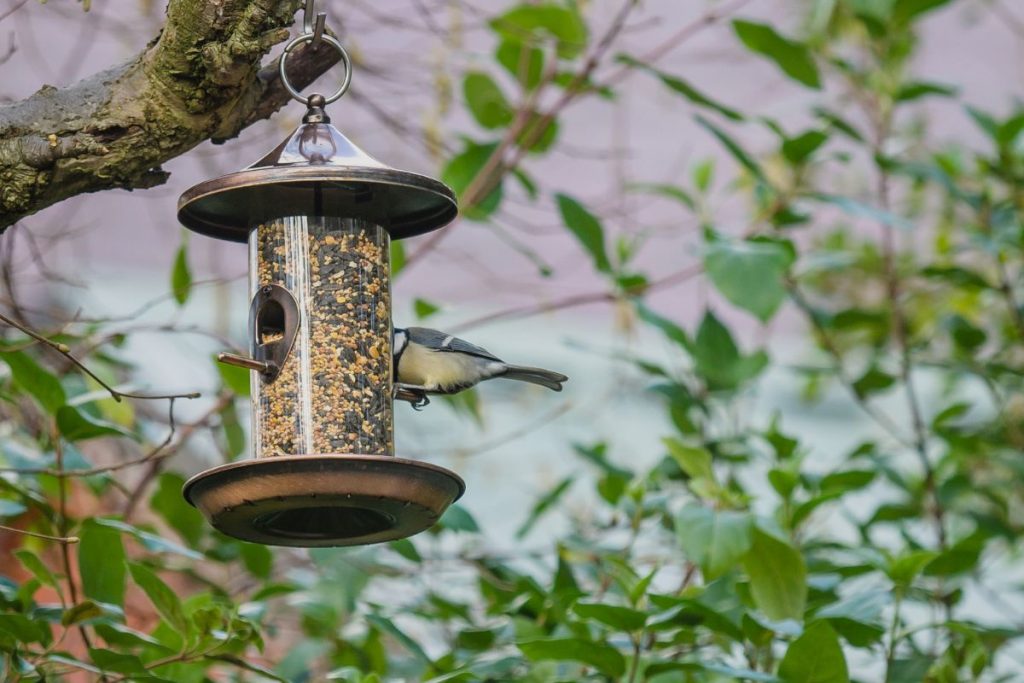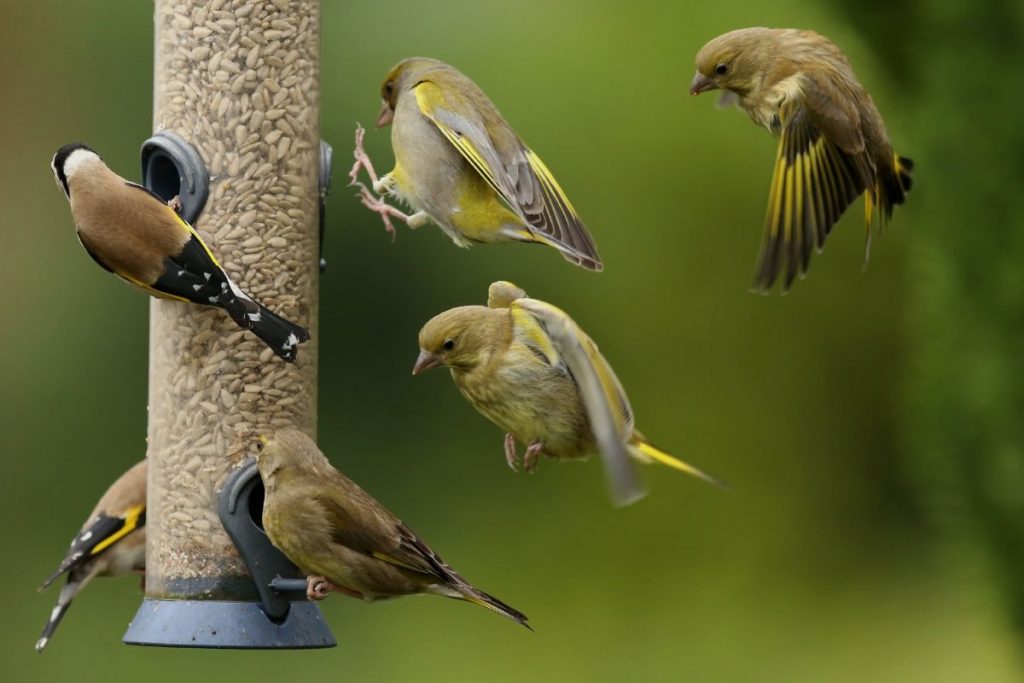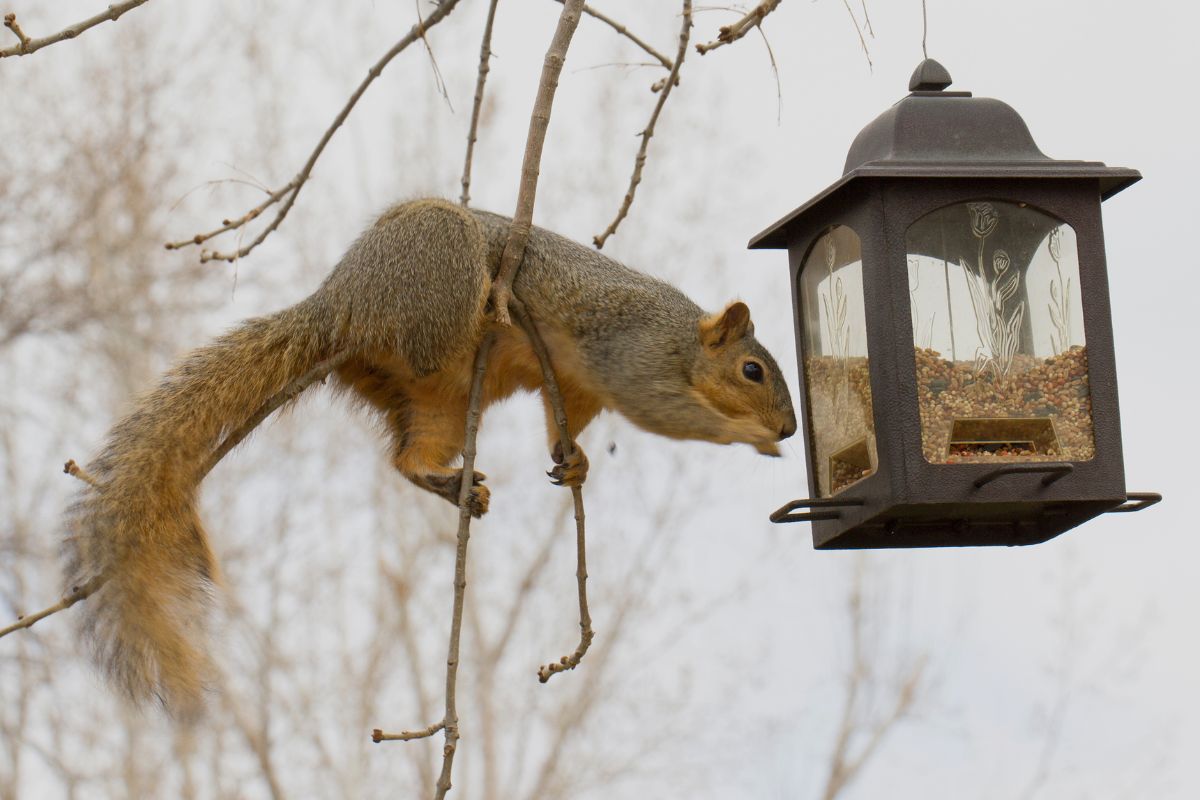Bird feeders play a crucial role in supporting bird populations, especially during harsh weather conditions or when natural food sources are scarce. However, squirrels have long been a challenge for bird enthusiasts, as these clever and agile creatures can easily raid bird feeders and consume the food intended for our feathered friends.
Over the years, the development of squirrel-proof bird feeders has become an essential aspect of wildlife management, benefiting both birds and bird lovers alike.
In this post, we will explore the fascinating history and evolution of squirrel-proof bird feeders, along with expert insights on squirrel behaviour and the impact of these feeders on bird populations.
NOTE:
This blog post contains everything you need to know about squirrel-proof bird feeders. However, if you’re only looking for a good squirrel-proof bird feeder, you can choose from the 13 options provided below – the 13 best squirrel-proof bird feeders.
- Early Attempts at Squirrel-Proof Bird Feeders
- Evolution of Squirrel-Proof Bird Feeder Designs
- Expert Insights into Squirrel Behavior
- Impact of Squirrel-Proof Bird Feeders on Bird Populations
- 13 Best Squirrel-Proof Bird Feeders
- Future Developments in Squirrel-Proof Bird Feeder Technology
- Conclusion
- FAQs – Squirrel-Proof Bird Feeders
- Q: How do squirrel-proof bird feeders benefit bird populations?
- Q: What are some early strategies to deter squirrels from bird feeders?
- Q: How do weight-activated squirrel-proof bird feeders work?
- Q: Can squirrels defeat the mechanism of weight-activated bird feeders?
- Q: What is the purpose of a cage-enclosed squirrel-proof bird feeder?
- Q: How do electronic squirrel deterrents work in bird feeders?
- Q: How has understanding squirrel behaviour helped in developing squirrel-proof bird feeders?
- Q: What are some potential future developments in squirrel-proof bird feeder technology?
- Q: How can adding cayenne pepper to bird food help deter squirrels?
- Q: What is a suet feeder?
- Q: Are there squirrel-proof suet feeders available?
- Q: How can squirrel baffles help protect bird feeders?
- Q: How do squirrel feeders help reduce squirrel activity at bird feeders?
- Q: What types of bird seeds can be used in squirrel-proof bird feeders?
- Q: What is a bird feeder pole, and how can it help deter squirrels?
- Q: How do tube feeders differ from other types of bird feeders?
- Q: How can a fat ball feeder be made squirrel-proof?
- Q: How do pole-mounted feeders help deter squirrels?
- Q: How can a seed tray help reduce waste and mess from bird feeders?
- Q: How can bird enthusiasts support both bird and squirrel populations responsibly?
- Q: How can safflower seeds be used to deter squirrels from bird feeders?
- Q: Can squirrel-proof bird feeders also deter larger bully birds?
- Q: Are there any environmentally-friendly squirrel-proof bird feeders available?
- Q: How can blue jays be deterred from raiding bird feeders?
- Q: What is the purpose of an adjustable weight setting in squirrel-proof bird feeders?
- Q: How can rechargeable batteries be used in electronic squirrel deterrents?
- Q: How do squirrel-proof bird feeders impact bird diversity and distribution?
- Q: Can bird baths help reduce squirrel activity around bird feeders?
- Q: How can Irish Spring soap be used to deter squirrels from bird feeders?
- Q: How can bird feeding stations be designed to deter squirrels?

Early Attempts at Squirrel-Proof Bird Feeders
The first attempts at designing squirrel-proof bird feeders involved simple techniques aimed at deterring squirrels from accessing the feeders. Some of these early strategies included:
- Slippery pole systems: Installing feeders on tall, smooth poles that squirrels could not climb.
- Baffles: Cone- or dome-shaped barriers placed above or below feeders to prevent squirrels from reaching them.
- Location-based strategies: Placing feeders in areas where squirrels had difficulty accessing, such as far from trees or buildings.
Evolution of Squirrel-Proof Bird Feeder Designs
As squirrel-proof bird feeder technology advanced, more sophisticated designs emerged, offering varying levels of protection against squirrels:
- Weight-activated feeders: These feeders rely on the weight of the visiting animal to trigger a mechanism that closes access to the seed. When a squirrel lands on the feeder, its weight causes the feeding ports to close, preventing it from reaching the food. While effective in some cases, determined squirrels can sometimes find ways to defeat the mechanism.
- Cage-enclosed feeders: These feeders feature an outer cage that encloses the feeder, allowing only small birds to enter and access the seed. The cage openings are typically too small for squirrels to fit through. However, some designs may still allow squirrels to reach the food by stretching through the cage bars.
- Electronic deterrents: Some bird feeders employ electronic components that deliver a mild, harmless shock to squirrels attempting to access the feeder, discouraging them from trying again. While these feeders can be highly effective, they are often more expensive and may require regular maintenance.
Expert Insights into Squirrel Behavior
Understanding squirrel intelligence and problem-solving abilities has been crucial in developing effective squirrel-proof bird feeders. Experts have observed squirrels overcoming various deterrents and adapting their behaviour to access bird feeders. These observations have led to design improvements that consider the persistence and agility of squirrels.

Impact of Squirrel-Proof Bird Feeders on Bird Populations
Squirrel-proof bird feeders have had several positive effects on bird populations, including:
- They have increased food availability for target bird species, which supports their survival during challenging periods.
- A positive effect on bird diversity and distribution, as feeders attract different bird species to an area.
- Potential indirect effects on squirrel populations, such as reduced access to bird feeders, may encourage squirrels to rely more on their natural food sources.
13 Best Squirrel-Proof Bird Feeders













Future Developments in Squirrel-Proof Bird Feeder Technology
The future of squirrel-proof bird feeder technology promises even more advanced and effective designs. Innovations may include:
- New materials and design features that offer improved resistance against squirrel attacks.
- Integration of smart technology and sensors to monitor bird feeder usage and detect squirrel activity.
- Considerations for environmental sustainability and impact, such as using eco-friendly materials or designing feeders that minimise waste.
Conclusion
The history and evolution of squirrel-proof bird feeders highlight the importance of continued innovation in this field. As we learn more about squirrel behaviour and their problem-solving abilities, we can develop even more effective designs that protect bird feeders from these persistent creatures. At the same time, it’s essential to balance the needs of both bird and squirrel populations, ensuring that we support wildlife in a responsible and sustainable manner.
By employing advanced squirrel-proof bird feeders and practising responsible bird feeding habits, we can contribute to the well-being of our local bird populations while also appreciating the cleverness and adaptability of squirrels.
Ultimately, the ongoing development of squirrel-proof bird feeder technology will benefit not only our feathered friends but also the countless bird fans who enjoy observing and supporting these beautiful creatures.
FAQs – Squirrel-Proof Bird Feeders
Q: How do squirrel-proof bird feeders benefit bird populations?
A: Squirrel-proof bird feeders increase food availability for target bird species, support their survival during challenging periods, have a positive effect on bird diversity and distribution, and encourage squirrels to rely more on their natural food sources.
Q: What are some early strategies to deter squirrels from bird feeders?
A: Early strategies included slippery pole systems, baffles, and location-based strategies, such as placing feeders far from trees or buildings.
Q: How do weight-activated squirrel-proof bird feeders work?
A: Weight-activated feeders rely on the weight of the visiting animal to trigger a mechanism that closes access to the seed. When a squirrel lands on the feeder, its weight causes the feeding ports to close, preventing it from reaching the food.
Q: Can squirrels defeat the mechanism of weight-activated bird feeders?
A: While weight-activated feeders can be effective, determined squirrels can sometimes find ways to defeat the mechanism.
Q: What is the purpose of a cage-enclosed squirrel-proof bird feeder?
A: Cage-enclosed feeders feature an outer cage that allows only small birds to enter and access the seed, with cage openings typically too small for squirrels to fit through.
Q: How do electronic squirrel deterrents work in bird feeders?
A: Electronic deterrents in bird feeders deliver a mild, harmless shock to squirrels attempting to access the feeder, discouraging them from trying again.
Q: How has understanding squirrel behaviour helped in developing squirrel-proof bird feeders?
A: By understanding squirrel intelligence and problem-solving abilities, researchers have been able to develop more effective squirrel-proof bird feeder designs that consider the persistence and agility of squirrels.
Q: What are some potential future developments in squirrel-proof bird feeder technology?
A: Future developments may include new materials and design features, integration of smart technology and sensors, and considerations for environmental sustainability and impact.
Q: How can adding cayenne pepper to bird food help deter squirrels?
A: Cayenne pepper can deter squirrels because they are sensitive to the spice, whereas birds do not feel the heat and can still enjoy the bird food.
Q: What is a suet feeder?
A: A suet feeder is a type of bird feeder designed to hold suet cakes or suet balls, which are high-energy food sources made from animal fat, seeds, and other ingredients that provide essential nutrients for birds.
Q: Are there squirrel-proof suet feeders available?
A: Yes, there are squirrel-proof suet feeders that feature protective cages or weight-activated mechanisms to prevent squirrels from accessing the suet.
Q: How can squirrel baffles help protect bird feeders?
A: Squirrel baffles are cone- or dome-shaped barriers placed above or below feeders to prevent squirrels from reaching them, making it more difficult for squirrels to access the bird food.
Q: How do squirrel feeders help reduce squirrel activity at bird feeders?
A: Squirrel feeders provide a dedicated food source for squirrels, which may reduce their motivation to raid bird feeders and encourage them to rely more on their natural food sources.
Q: What types of bird seeds can be used in squirrel-proof bird feeders?
A: A variety of bird seeds, such as sunflower seeds, sunflower hearts, safflower seeds, and thistle seeds, can be used in squirrel-proof bird feeders.
Q: What is a bird feeder pole, and how can it help deter squirrels?
A: A bird feeder pole is a tall, smooth pole used to mount bird feeders, making it difficult for squirrels to climb and access the feeder.
Q: How do tube feeders differ from other types of bird feeders?
A: Tube feeders are a type of bird feeder featuring a cylindrical design with multiple feeding ports, allowing several birds to feed simultaneously. They often include perches for birds to rest while eating, and some tube feeders are designed with squirrel-proof features to deter pesky squirrels.
Q: How can a fat ball feeder be made squirrel-proof?
A: A squirrel-proof fat ball feeder typically features a metal cage or weight-activated mechanism to prevent squirrels from accessing the fat balls while still allowing birds to feed.
Q: How do pole-mounted feeders help deter squirrels?
A: Pole-mounted feeders, especially those with slippery poles or squirrel baffles, make it more challenging for squirrels to climb and access the bird food, providing extra protection for the feeders.
Q: How can a seed tray help reduce waste and mess from bird feeders?
A: A seed tray can be attached to the bottom of a bird feeder to catch falling seeds and debris, reducing waste and keeping the area around the feeder cleaner.
Q: How can bird enthusiasts support both bird and squirrel populations responsibly?
A: Bird enthusiasts can use advanced squirrel-proof bird feeders and practice responsible bird feeding habits, such as providing a separate squirrel feeder, to support both bird and squirrel populations in a responsible and sustainable manner.
Q: How can safflower seeds be used to deter squirrels from bird feeders?
A: Safflower seeds are less appealing to squirrels compared to other seeds like sunflower seeds. By using safflower seeds in bird feeders, bird enthusiasts can make the feeders less attractive to squirrels while still providing food for birds.
Q: Can squirrel-proof bird feeders also deter larger bully birds?
A: Yes, some squirrel-proof bird feeders, especially cage-enclosed feeders, can also deter larger bully birds by allowing only smaller birds to enter and access the seed.
Q: Are there any environmentally-friendly squirrel-proof bird feeders available?
A: Yes, some squirrel-proof bird feeders are made with eco-friendly materials or designed to minimize waste, making them more environmentally-friendly options.
Q: How can blue jays be deterred from raiding bird feeders?
A: Blue jays can be deterred by using cage-enclosed squirrel-proof bird feeders, which prevent larger birds like blue jays from accessing the seeds while allowing smaller birds to feed.
Q: What is the purpose of an adjustable weight setting in squirrel-proof bird feeders?
A: Adjustable weight settings in squirrel-proof bird feeders allow users to customize the mechanism’s sensitivity, ensuring that it activates only when heavier animals like squirrels land on the feeder while allowing lighter birds to feed.
Q: How can rechargeable batteries be used in electronic squirrel deterrents?
A: Rechargeable batteries can provide a more sustainable and cost-effective power source for electronic squirrel deterrents in bird feeders, reducing the need for constant replacement of non-rechargeable batteries.
Q: How do squirrel-proof bird feeders impact bird diversity and distribution?
A: Squirrel-proof bird feeders attract different bird species to an area by providing a reliable food source, increasing bird diversity and distribution in the vicinity.
Q: Can bird baths help reduce squirrel activity around bird feeders?
A: Bird baths can provide an additional point of attraction for birds, potentially drawing them away from bird feeders and reducing the concentration of bird activity in one area, which may in turn help to reduce squirrel interest in the feeders.
Q: How can Irish Spring soap be used to deter squirrels from bird feeders?
A: Irish Spring soap can be grated or hung near bird feeders, as its strong scent may deter squirrels from approaching the area without affecting birds.
Q: How can bird feeding stations be designed to deter squirrels?
A: Bird feeding stations can incorporate squirrel-proof features, such as slippery poles, baffles, or cage enclosures, to prevent squirrels from accessing the various feeders and bird food sources within the station.
